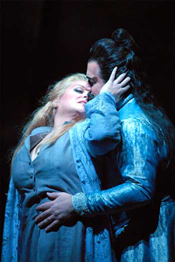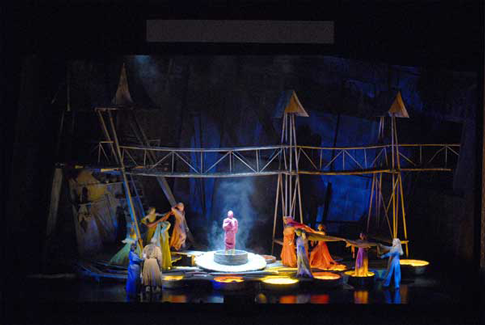
04 Dec 2007
Die Frau ohne Schatten in Chicago
Die Frau ohne Schatten is the story of a being of purely sensual spirit who defies the temptation to do evil, thereby demonstrating a moral soul and achieving humanity.
Anthony Minghella's visually-arresting staging, a co-production with New York's Metropolitan Opera and the Lithuanian National Opera, returned this month to its original home at the London Coliseum after a gap of two years.
While I eagerly seized upon an opportunity to hear Angelika Kirschlager live for the first time, having written in very recent weeks about not one but two of the star mezzo’s current CD releases, I ventured to Frankfurt’s Alte Oper feeling a little bit like her stalker.
When I worked in the Archives of the Met, I was custodian of several hundred costumes, many from the days when divas traveled with steamer trunks full of things run up just for them, by the finest designers, with the most glamorous materials, in the colors and styles that suited the ladies themselves.
There is nothing redeeming about Sir John Falstaff, one of Shakespeare’s most lively comic characters and the subject of Verdi’s final opera, and yet, inexplicably, we love him.
What constitutes an “international opera star” these days, anyway?
The Metropolitan Opera audience loves its Wagner, and the management for the last several decades has, alas, made sure we aren’t spoiled: it’s a rare season that gets more than two production revivals of Wagner, and some years there have been none.
With her performance of the “Four Last Songs,” ably partnered by Michael Tilson Thomas and his San Francisco Symphony, Deborah Voigt emphatically confirmed her place as one of the glories of the current roster of Strauss interpreters.
John Adams, whose opera Nixon in China set the bar for post-minimalism in the lyric theatre, has once again scored a success with his latest work.
Wagner’s all-conquering chic made apocalyptic music-dramas drawn from folklore the ideal of the nationalistic era; every serious opera composer of the time felt obliged to attempt something in that line.
In this country art and politics are rarely bedfellows — strange or otherwise; indeed, it’s seldom that the two meet under the same roof.
Regarded, until the modern vogue for earlier masters, as the senior surviving grand master of opera, Gluck never quite becomes fashionable and never quite vanishes.
There is no middle ground in War and Peace — or, rather, it’s all middle ground, like a battlefield, and you may feel as if every soldier in Russia (and in France) has marched over you.
Once upon a time, we used to only dream about a stellar pairing like Barcelona’s Gran Teatre del Liceu has fielded for their current offering on display: “La Cenerentola.”
Enough ink was spilled last year gushing over Valencia’s new Calatrava-designed opera house and Arts and Science park that I had been chomping at the bit for the opportunity to take in a performance there as soon as my availability and, more important, the availability of a still-very-hard-to-find ticket coincided.
Do we too easily take Richard Strauss for granted? The question is prompted by the superlative production of “Frau ohne Schatten” that was the highlight of the fall season at the Chicago Lyric Opera.
Watching The Queen of Spades staged by a Russian company is often an unforgettable experience.
If Belfast in Northern Ireland isn’t a city that immediately springs to mind as a centre of musical excellence then it’s not for want of talent, initiative and professionalism within its cultural community.
After the triumph of his fifth opera, Ernani, Verdi could have gone on writing howling melodramas and made a mint.
Not long ago, English National Opera declared an intention to capitalise on its name and history by placing greater emphasis on English works.
Despite 19th-century Russia’s reputation as an Italian opera haven, Verdi’s late masterpiece Otello found acceptance there only with great difficulty, even though in its 1889 premiere the title role acquired a great local interpreter in the Mariinsky Theater primo uomo, Nikolai Figner.

Die Frau ohne Schatten is the story of a being of purely sensual spirit who defies the temptation to do evil, thereby demonstrating a moral soul and achieving humanity.
Set in some hazy fin-de-siècle fairy tale Orient, the tale is ageless, its symbolic structure based on many an ancient trope and theme, especially beloved in such near-contemporary versions as Andersen’s “Little Mermaid,” Pinocchio and Die Walküre — but Frau could never have been created for the stage before the era of electric stage lighting. There is the matter of the Empress’s shadow (which must not exist until the penultimate scene, when it should be apparent and obvious), but the many other spectral intruders and the pauseless flow of scene to scene and world to world would have defied the pre-electronic stage. Hofmannsthal and Strauss deserve credit for rooting their homegrown myth so securely in a mystic fabulous while making full use of the latest (1919) technology to bring it to life. Companies that venture to stage Frau must gather the finest vocal and instrumental forces, needless to say, or risk falling on their faces — but they also risk disaster if they simplify excessively, if they do not go for broke in the visual line.
All of this was clear to the Lyric Opera of Chicago when they put a new production of the opera (the second in their history) together this fall. The stage is agog with smoke and mirrors, turntables within turntables so that characters and set elements drift apart and off the stage, ominous ramparts and portals whose openings and closings must be calculated to a hair, scrims and smoke machines, cages and lightning bolts of neon tubing, whirling dancers almost invisible in the darkness and startlingly visible (nearly nude) hung from the ceiling or rising from a well mid-stage, singers obliged to perform while on horseback in mid-air, or from a rickety bridge across mid-stage, or behind a distorted eye or confined to a spotlight by fluttering hands, barely seen. The gimcrackery is choice, the stage pictures and the vision of three separate worlds (spirit, earthy, and the imperial middle realm) rather more coherent as well as handsome than in, for example, Herbert Wernicke’s recent Met production.
Another word about the dancers, who deserve it: dance is most often used in opera either as divertissement or sideshow, in any case as a separate thing where one relaxes the ear and lets the eye take over, welcome or unwelcome as that may be. The LOC Frau is a rare and impressive example of using dance as part of the action, enhancing the magic, motile scenery. The dancers never call attention to themselves (as they so often do when choreographers take up direction); they are part of the stage magic here, creating the dungeons in Act III simply as hands fluttering in the faces of those imprisoned, swaying about the Amme in Act I to suggest the world of dark spirits she inhabits, becoming the hands and heads of the unborn children and the flood that sweeps the scene away in Act II.
 A scene from Act I of the Paul Curran-directed new production of Die Frau ohne Schatten, part of Lyric Opera of Chicago's 2007-08 season. Photo by Robert Kusel/Lyric Opera of Chicago.
A scene from Act I of the Paul Curran-directed new production of Die Frau ohne Schatten, part of Lyric Opera of Chicago's 2007-08 season. Photo by Robert Kusel/Lyric Opera of Chicago.
The singing is sumptuous, especially from the ladies. Christine Brewer is today’s great Wagnerian heroine, her voice room-filling and rock-solid but never cold; rather, warm, deeply moving, an earth-mother Dyer’s Wife. Deborah Voigt’s Empress is a shooting star spewing Ds and C-sharps into the heavens of Act III and Jill Grove, in a breakout performance, was in complete command as the wicked Amme, one of the toughest roles in the repertory. Robert Dean Smith is evidently immune to acrophobia — and I refer to the Emperor’s tessitura as well as the flying horse. There were a few rocky phrases from Franz Hawlata, generally a sturdy and sympathetic Barak, the figure whose baritone must be the center of this morally centered tale. The twenty small roles were well-handled, in part by having some of them acted (the Falcon, the Apparition) by dancers while the singers stood discretely behind them, garbed in black. Sir Andrew Davis drew all the complexities together to tell this complicated story clearly and mellifluously. The usual cuts were, alas, observed — the show nonetheless ran to four and a half hours with intermissions.
One comes away from such a performance feeling, in the first place, the awe any first-rate presentation of this complicated opera must produce — who was keeping track of which doors should rise and which fall while tableaux and performers floated in and out of them, often in pitch dark? Rare is the military operation that boasts such precision. Paul Curran’s production, Kevin Knight’s designs and David Jacques’ lighting were constantly inventive and astonishing — though I did think the mystic Empress should be dreaming in something classier than a big brass bed, and the upturned umbrella used as a boat in Act III seemed to have strayed in from some other production entirely. These two props screamed “Fix me!” in tones as loud as any brass in Strauss’s orchestra.
I did have one misgiving about the direction: In their efforts to “humanize” a story full of tropes and archetypes, the producers and the actors (one must discuss them here in their non-singing aspects) have given the characters behavior and expression that suggest unnecessary and inexplicable subtexts to the action. We are in a fairy tale world here, where “spirit” beings aspire to human-hood, fish dinners sing, and apparitions seduce. This can be staged “realistically” — as at the Wiener Staatsoper, where the Empress is a modern Viennese lady on a couch talking her way through psychoanalysis — but having chosen, as Chicago has, to give us a fairy tale with all the trimmings, it is unwise to give the characters unnecessary layers: good should be good here, and wicked, wicked. Fairy tale, like our unconscious, knows no half measures.
Awkwardness is most clearly apparent with Deborah Voigt’s Empress, the titular lady without a shadow. Having played the role “archetypically” in half a dozen other stagings, the newly svelte and agile Miss Voigt has decided to get into the swim of things. Instead of sitting in the shadows observing the Nurse’s devious plots and the pain they inflict on Barak and his Wife, developing a moral conscience and, thus, a soul, this Empress is actively complicit with the wickedness, crowning the Dyer’s Wife, flirting with the Dyer, observing the temptations with a cynical smirk. It makes her transformation — the central moments of the drama — more difficult to accept. Grove’s Amme, too, tended at times to convey comic fluster rather than malice in her gestures, which contradicts the assurance of her stated utterances.
But these are minor points in a thoroughly winning evening of opera at its grandest.
John Yohalem
Click here for audio and video courtesy of Lyric Opera of Chicago.